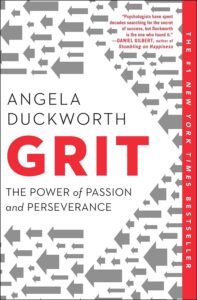What We’re Reading: “Grit” by Angela Duckworth
Grit by Angela Duckworth
An exploration of grit and how you can grow it from the inside out
 I recently picked up Angela Duckworth’s Grit: The Power of Passion and Perseverance (Scribner, 2016). Dr. Duckworth is a psychology professor at the University of Pennsylvania, and her stated purpose in life is “to use psychological science to help kids thrive.”
I recently picked up Angela Duckworth’s Grit: The Power of Passion and Perseverance (Scribner, 2016). Dr. Duckworth is a psychology professor at the University of Pennsylvania, and her stated purpose in life is “to use psychological science to help kids thrive.”
She opens the book with her central hypothesis: “What we eventually accomplish may depend more on our passion and perseverance than on our innate talent.” Hence, her focus on the psychological asset of grit.
Grit is what goes through our heads when we fall down or get side-tracked. It’s the trait that carries us through the marathon of life, and is “more about stamina than intensity” explains Duckworth. She describes grit as a special blend of passion and endurance that pushes us to keep going, in good times and in bad.
After presenting data and anecdotes about how grit is often the best predictor of success, Duckworth offers a four-part recipe for growing your own grit from the inside out:
- Find & Develop Your Interests: Passion comes from life experience. “Nobody is interested in everything, and everyone is interested in something,” writes Duckworth. Therefore, she says we need to try things on for size throughout our lives, to help us discover what ignites our passion. Then we should seek to develop and deepen our knowledge in that area. “Ask yourself a few simple questions,” she advises. “What do I like to think about? Where does my mind wander? What do I really care about? What matters most to me? How do I enjoy spending my time? And, in contrast, what do I find absolutely unbearable?” These questions help identify interest, the first ingredient for grit.
- Practice with Intention: Practice takes energy and effort to make it deliberate and worthwhile. It also takes a significant amount of time, which is why “the ten-thousand hour rule” and “the ten-year rule” have been widely popularized. Eventually, however, good practice is rewarded by something called “flow” – the ease and exuberance you experience when you really hit your stride. Duckworth states, “Gritty people do more deliberate practice and experience more flow.”
- Connect to a Broader Purpose: Purpose is what motivates us to help others through our work. Duckworth believes we need that level of inspiration to find a deeper meaning in what we do, and to become grittier. She recommends reflecting on the work you already do, and how you are making a difference in the world, or thinking about how you could make small, meaningful changes to better connect to your core values.
- Embrace Hope: Optimists and pessimists are equally likely to encounter adverse events, but gritty people tend to explain these events in more positive terms, such as how they can learn from them. Duckworth connects this ingredient to her colleague Carol Dweck’s research on a growth mindset. In short, a growth mindset helps you be grittier, and even leads you to seek out new challenges that make you stronger in the long-run. Here, Duckworth recommends that we recognize our intelligence and talent can substantially change throughout life, that we “practice positive self-talk,” and that we ask for help when we need it.
Ultimately, grit is a book about how passion and perseverance trump innate talent in achieving goals. It is a tome that makes us all feel like players in the game of life, where we can discover, set, nurture, and relentlessly pursue our own destiny.
